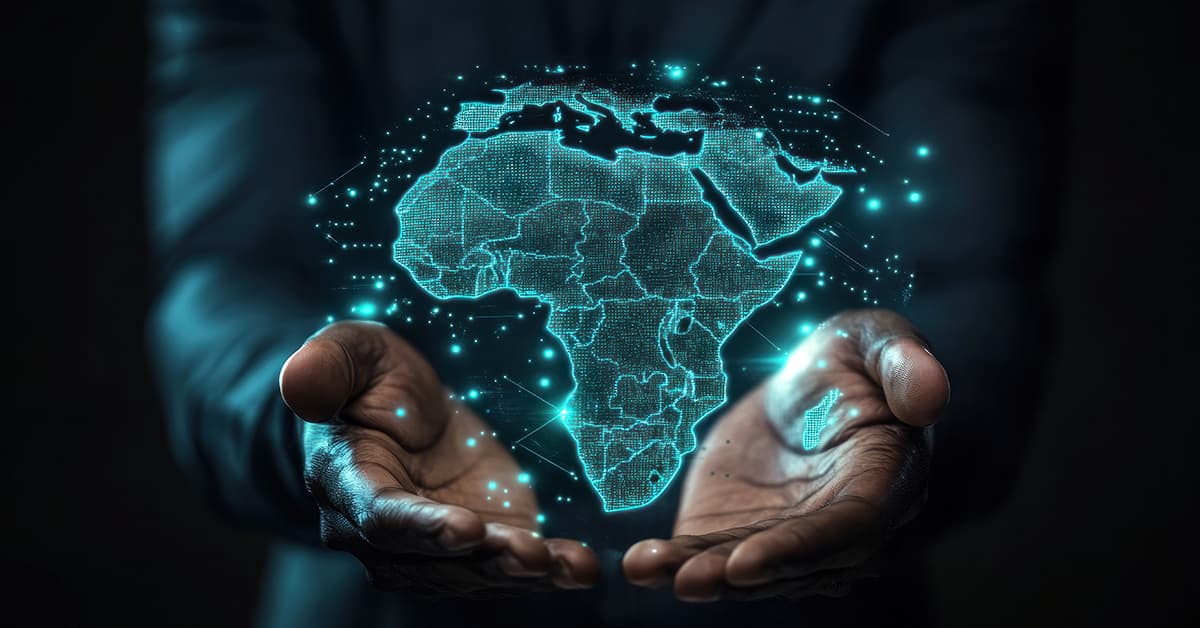Artificial Intelligence (AI) is no longer a futuristic concept—it is a central driver of global economic growth. In 2023, the global AI market was valued at $196.6 billion and is projected to reach $1.8 trillion by 2030, growing at a CAGR of 37.3%. McKinsey estimates AI could generate $4.4 trillion in annual economic value, transforming industries such as healthcare, finance, agriculture, logistics, and manufacturing through automation, predictive analytics, and intelligent decision-making. Leading economies, such as the United States, China, and the UK, have made substantial investments in AI. China’s national AI strategy aims to dominate the sector by 2030, while U.S. companies lead in innovation and venture capital. These countries have developed robust AI ecosystems that involve government, academia, and private enterprises, driving advancements in areas such as autonomous systems, digital health, and smart infrastructure.
In contrast, Africa contributes less than 1% to global AI research and development. While the continent faces barriers such as limited infrastructure, fragmented data systems, and a shortage of AI talent, it also holds immense potential. Africa’s young population, increasing mobile penetration, and emerging tech hubs present a unique opportunity to adopt AI technologies through scalable and contextualized solutions. This is where Managed AI Services come in—offering a pathway for African countries to leapfrog legacy systems and rapidly integrate AI without heavy upfront investments. By outsourcing AI capabilities, governments and enterprises can overcome technical and talent constraints, thereby deploying intelligent systems in key areas such as healthcare, agriculture, governance, and financial services.
As AI reshapes the global economy, Africa must not remain on the sidelines. With strategic investment, ethical frameworks, and inclusive policies, the continent can turn this technological wave into a catalyst for sustainable and equitable development.
.jpg)
Global Market Comparison: Where Africa Stands
While the United States, China, and Western Europe dominate the AI space, each boasting multi-billion-dollar AI innovation ecosystems, Africa’s AI footprint is in its formative stage. The U.S. alone accounted for nearly 36% of global AI investments in 2023, with China close behind at 27%. Countries such as the UK, Germany, and France are developing national AI strategies with direct investments in research, startups, and data infrastructure.
In comparison, African countries are only beginning to craft national AI policies—Rwanda, Egypt, Kenya, and South Africa leading the way. The African Union is developing a continental AI strategy to promote the adoption of ethical AI, skills development, and cross-border innovation. However, the lack of infrastructure, limited access to data, and a shortage of skilled professionals remain significant hurdles.
What Are Managed AI Services?
Managed AI Services refer to end-to-end, outsourced solutions that enable organizations to adopt Artificial Intelligence technologies without the need for deep in-house expertise or costly infrastructure. These services are delivered by specialized providers who handle every stage of the AI lifecycle—starting from strategy formulation and data preparation to model development, deployment, and ongoing optimization. Instead of investing heavily in AI infrastructure or hiring data science teams, organizations can opt for managed AI solutions hosted on scalable cloud platforms. These services typically begin with an AI readiness assessment to identify suitable use cases, followed by data engineering to collect, clean, and prepare data for machine learning models. Service providers then develop or adapt AI models to meet specific needs—whether it's fraud detection, customer service automation, crop disease prediction, or traffic management.
Once deployed, the AI systems are integrated into existing digital ecosystems such as government portals, enterprise software, or mobile apps. Crucially, managed AI services include ongoing monitoring, maintenance, and retraining to ensure models stay accurate as new data becomes available. This continuous support ensures that clients benefit from reliable, adaptive, and compliant AI systems without having to manage the technical complexities themselves. Managed AI Services are particularly valuable in Africa, where limited digital infrastructure, data fragmentation, and a shortage of AI talent can hinder adoption. By offering AI “as a service,” these solutions lower the barrier to entry, enabling governments and businesses to quickly deploy intelligent systems for public service delivery, economic planning, and innovation, paving the way for a scalable and inclusive digital transformation.
.jpg)
Challenges and Considerations
While Managed AI Services offer immense promise for Africa’s digital advancement, several challenges must be addressed to ensure the sustainable and ethical adoption of these services. One of the foremost issues is data privacy and security. Many African countries are still in the early stages of implementing robust data protection laws, making it critical to establish clear regulatory frameworks that govern how AI systems collect, store, and use personal data. Without this, trust in AI solutions may erode, particularly in sensitive sectors such as healthcare and finance.
Another significant concern is the ethical use of AI. Bias in algorithms can inadvertently reinforce social and economic inequalities, especially when models are trained on non-representative data. Transparent model design, inclusive data policies, and accountability mechanisms are essential to mitigate these risks. Equally important is the challenge of digital infrastructure. In rural and underserved areas, poor internet connectivity and limited access to cloud services hinder the deployment of AI tools, creating a gap between urban innovation hubs and remote communities. Moreover, digital literacy remains a barrier. Many potential users and public administrators lack the necessary skills to interpret and interact with AI outputs effectively. Therefore, capacity building, continuous training, and community engagement must be integrated into any AI deployment strategy to ensure a broad and meaningful impact.
Conclusion: Charting the Road Ahead
As Africa advances toward a digital future, Managed AI Services present a transformative opportunity to overcome infrastructure gaps and skill shortages. By leveraging scalable, outsourced AI solutions, countries can accelerate innovation across various sectors, including healthcare, agriculture, finance, and governance. However, success depends on more than technology—it requires strong policy frameworks, ethical standards, and cross-sector collaboration. Governments must prioritize AI education, invest in digital infrastructure, and promote inclusive innovation ecosystems. With the proper roadmap, Africa can not only adopt AI but also shape it to reflect its unique challenges and aspirations, ensuring sustainable and equitable development for generations to come.
CSM Tech possesses strong capabilities to support organizations in implementing and managing AI-driven solutions, with a skilled team experienced in AI integration, data analytics, and digital transformation. CSM Tech is well-equipped to assist clients in navigating complex AI projects and optimizing their operations. This foundation positions CSM Technologies to expand into managed AI services in the future, potentially enabling businesses to leverage AI technologies effectively and drive innovation and improve decision-making.










































We will verify and publish your comment soon.